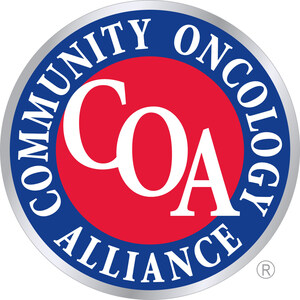Community Oncologists Hold Emergency Hill Day to Warn Congress on Medicare Sequester
Mandated Doubling of Sequester Cut to Cancer Drugs in Tax Reform Bill Will Reduce Access and Increase Costs for Patients
WASHINGTON, Nov. 30, 2017 /PRNewswire-USNewswire/ -- Community oncology leaders are in D.C. today for emergency meetings with Congress and the Administration to warn them on the impact on cancer care of the Medicare sequester cut. The emergency Community Oncology Alliance (COA) fly in has been prompted by the continued momentum of the tax bill in both the U.S. House and Senate which would double the current sequester cut, and by a proposed extension of the sequester.
Physicians and practice administrators from across the country have reworked schedules, moved patient visits, and more, to warn policymakers of the real dangers that the continued use of the sequester cut as a budget gimmick has a very real and dangerous impact on cancer care in the United States.
"Our elected officials need to understand that this sequester may seem like funny money to them but it is a slow bleed closing cancer clinics and forcing them into the waiting arms of more expensive hospital systems – especially those profiting off 340B," said Jeff Vacirca, MD, president of COA and CEO of NY Cancer Specialists. "Congress needs to understand that their doubling down on the sequester and constantly extending it will result in community oncology practices being forced to shut their doors, which will cause access issues for patients and increase treatment costs as cancer care shifts to expensive hospitals."
In 2013, the Centers for Medicare & Medicaid Services (CMS) enacted a 2% sequester payment cut to Medicare. The sequester cut to cancer drugs set up the nation's cancer care system for consolidation and increased costs to seniors, Medicare, and taxpayers. Many oncology practices have not survived or are struggling to survive under the sequester cut to Medicare drug reimbursements that often are below costs.
The quantifiable impact since the 2013 Medicare sequestration cuts were imposed on cancer drugs are stark and stand as a very real warning to policymakers:
- 91 cancer treatment clinics have closed – a 31.6% increase in treatment site closings. (Source)
- 130 independent community cancer clinics, typically comprised of multiple treatment clinics, have merged into hospitals – a 27.7% increase in consolidation of independent practices into the more expensive hospital setting. (Source)
- The sequester cut to cancer drugs has driven up costs for seniors, Medicare, and taxpayers.
- The cost of the consolidation of cancer care into hospitals is estimated at
- $2 billion to Medicare in in the first full year (2014). (Source)
- $500 million to seniors for that same period.
It is about to happen again.
The Congressional Budget Office has warned that "pay-as-you-go" rules mandate a 4% sequester cut to Medicare to offset the deficit increases caused by the proposed tax bill. This would double the ongoing 2% sequester cut to Medicare payments implemented in 2013. Additionally, to pay for Medicare and other programs expiring this year, Congress is once again using the budget gimmick of extending the sequester at the end of the 10-year budget window.
Community oncology practices are where the majority of Americans with cancer are treated. (Source) Closing community practices limits access to care – particularly for rural patients – and shifts the site of cancer treatment into the much more expensive hospital setting. Specifically, this means:
- Consolidation into the more expensive hospital systems drives up costs for seniors as well as all taxpayers who fund Medicare.
- What worsened the impact of the 2013 2% sequester cut was the prior Administration's flawed decision to apply the cut specifically to payment for cancer drugs and other critical specialty therapies. This illegally bypassed the Congress, which in 2003 specifically set in law the reimbursement rate for Medicare Part B drugs.
"With Congress continually extending the sequester, and now the new threat of doubling the sequester cut, our message today is simple: the application of the sequester to cancer drugs and other critical Medicare Part B therapies must be stopped," said Ted Okon, executive director of COA. "Not only is applying the sequester cut to Part B drug payments illegal and unconstitutional, but it's actually driving costs up for seniors, Medicare, and all taxpayers. It's simply irrational."
About the Community Oncology Alliance: COA is a non-profit organization dedicated to advocating for community oncology practices and, most importantly, the patients they serve. COA is the only organization dedicated solely to independent community oncology where the majority of Americans with cancer are treated. The mission of COA is to ensure that cancer patients receive quality, affordable, and accessible cancer care in their own communities. For more than 15 years, COA has built a national grassroots network of community oncology practices to advocate for public policies that benefit cancer patients.
To learn more about COA, visit www.CommunityOncology.org.
Follow COA on Twitter at www.twitter.com/oncologyCOA or on Facebook at www.facebook.com/CommunityOncologyAlliance.
SOURCE Community Oncology Alliance
Related Links
WANT YOUR COMPANY'S NEWS FEATURED ON PRNEWSWIRE.COM?
Newsrooms &
Influencers
Digital Media
Outlets
Journalists
Opted In





Share this article